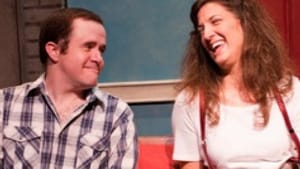Stay in the Loop
BSR publishes on a weekly schedule, with an email newsletter every Wednesday and Thursday morning. There’s no paywall, and subscribing is always free.
The Gilda we didn’t know, until now
‘Bunny Bunny’: The real Gilda Radner (1st review)

Bunny Bunny, first produced by the Philadelphia Theatre Company in 1997, was a series of scenes from the lives of the former “Saturday Night Live” writer Alan Zweibel and the comedienne Gilda Radner, as recalled by Zweibel. They met when auditioning for the TV show’s first season and had a close buddy, almost-lover relationship.
In the original, Gilda was played by Paula Cale, who went on to appear in several TV sitcoms. Zweibel was the soft-spoken Bruno Kirby, who died of leukemia in 2006.
The comedy proceeded to a two-month run off-Broadway. Since then most of the play’s revivals have been associated with cancer awareness events. (Radner died of ovarian cancer in 1989, at the age of 42.)
This revival, however, reveals a play that stands on its theatrical feet. Most of its success is due to the fact that Leah Walton, as Gilda, does not do comic bits; instead she portrays a three-dimensional person.
What draws us to her is the fact that Radner was deeply insecure and suffered from eating disorders and anxiety. She was not as shy as Zweibel, who hid behind a potted plant at his first audition, but she was self-effacing, reaching out to befriend everyone around her, from co-workers to cleaning staff. This quality makes us care about her.
Matt Pfeiffer is an appealing narrator and embodiment of Zweibel (who, by the way, went on to behind-the-scenes acclaim as co-creator of Billy Crystal’s autobiographical show, 700 Sundays). In the course of this play Radner encourages Zweibel to propose to a young woman he just met named Robin Blankman. In real life they’re still married, with three children and two grandchildren. Radner was childless.
Matt Tallman contributes a series of incidental characters, marked by quick and funny costume changes.
The 1997 production had dazzling sets by the much-honored scenic designer David Gallo. This production takes place on a flat-level floor rather than elevated behind a proscenium. The players are right in front of us. You want to reach out and hug Walton-Radner.♦
To read another review by Naomi Orwin, click here.
To read a response, click here.
In the original, Gilda was played by Paula Cale, who went on to appear in several TV sitcoms. Zweibel was the soft-spoken Bruno Kirby, who died of leukemia in 2006.
The comedy proceeded to a two-month run off-Broadway. Since then most of the play’s revivals have been associated with cancer awareness events. (Radner died of ovarian cancer in 1989, at the age of 42.)
This revival, however, reveals a play that stands on its theatrical feet. Most of its success is due to the fact that Leah Walton, as Gilda, does not do comic bits; instead she portrays a three-dimensional person.
What draws us to her is the fact that Radner was deeply insecure and suffered from eating disorders and anxiety. She was not as shy as Zweibel, who hid behind a potted plant at his first audition, but she was self-effacing, reaching out to befriend everyone around her, from co-workers to cleaning staff. This quality makes us care about her.
Matt Pfeiffer is an appealing narrator and embodiment of Zweibel (who, by the way, went on to behind-the-scenes acclaim as co-creator of Billy Crystal’s autobiographical show, 700 Sundays). In the course of this play Radner encourages Zweibel to propose to a young woman he just met named Robin Blankman. In real life they’re still married, with three children and two grandchildren. Radner was childless.
Matt Tallman contributes a series of incidental characters, marked by quick and funny costume changes.
The 1997 production had dazzling sets by the much-honored scenic designer David Gallo. This production takes place on a flat-level floor rather than elevated behind a proscenium. The players are right in front of us. You want to reach out and hug Walton-Radner.♦
To read another review by Naomi Orwin, click here.
To read a response, click here.
What, When, Where
Bunny Bunny. By Alan Zweibel; Noah Herman directed. 1812 Productions through October 27, 2013 at Independence Studio at the Walnut Street Theatre, 825 Walnut St., 3rd floor. (215) 592-9560 or www.1812Productions.org.
Sign up for our newsletter
All of the week's new articles, all in one place. Sign up for the free weekly BSR newsletters, and don't miss a conversation.

 Steve Cohen
Steve Cohen